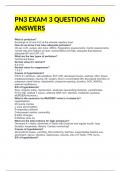PN3 EXAM 3 QUESTIONS AND
ANSWERS
What is perfusion?
Exchange of o2 and Co2 at the alveolar-capillary level.
How do we know if we have adequate perfusion?
O2 sat, LOC, pulses, skin color, ABG's, Respiratory assessments, Cardio assessments,
normal rate and rhythym of heart, normal RBCs and Hgb, adequate fluid balance,
adequate BP and CVP, UO
What are the two types of perfusion?
Central and tissue
Normal value for calcium?
8.5-10.5
Normal value for magnesium?
1.3-2.1
Causes of hyperkalemia?
PO/IV K+ administ., salt substitute, ECF shift, decreased insulin, acidosis, DKA, tissue
breakdown(sepsis, trauma, MI, surgery, fever), uncontrolled DM, decreased excretion of
potassium (renal failure, dehydration, potassium-sparing, diuretics, ACE, NSAIDs,
adrenal insufficiency.
S/S of hyperkalemia?
Slow, irregular pulse, hypotension, weakness (ascending paralysis), paresthesias,
PVCs Vfib, peaked T waves, widened QRS, N/V, diarrhea. (metabolic acidosis)
MURDER(neumonic)
What is the neumonic for MURDER? what is it related to?
Hyperkalemia
M-muscle cramps
u-urine abnormalities
R-respiratory distress
D-decreased cardiac contractility
E-EKG Changes
R-Reflxes (lack of)
What are the interventions for high potassium?
Decrease K+ intake, administer IV fluids with Dextrose and regular insulin, loop
diuretics, kayexalate, dialysis, Cardiac monitoring!!
Causes of hypokalemia?
abnormal GI losses, vomitting, NG suctioning, diarrhea, inappropriate laxative use,
alcoholism, dig tox, diuretics, diaphoresis, wounds, lots of IV fluids, TPN, burns.
S/S of hypokalemia?
, Weak, irregular pulse, weakness, muscle cramping, decreased muscle tone,
paresethesia, mental confusion, PVCs, bradycardia, blocks, vTach, inverted T waves,
ST depression, abd distention, constipation, illeus, polyuria. (Metabolic alkalosis)
Interventions for hypokalemia?
replace K+, cardiac monitoring, assess neuro and cardiac status, muscle tone and
reflex, bowel sounds, respiratory
Causes of hypernatremia?
Excessive NA intake, hypertonic solutions, heat stroke, near drowning is salt water,
diabetes insipidus, hyperglycemia, diarrhea, diaphoresis, burns, excess sodium
retention(cushings, glucocorticoids, aldosteroneism).
S/S of hypernatremia?
Thirst, restlessness, irritability, muscle twitching, respiratory compromise, decreased
DTR, coma, seizures, dry mucous membranes, hyperactive bowel sounds, abd
cramping, nausea, edema, warm flushed skin, oliguria.
Neumonic for hypernatremia?
FRIED SALT
F-fever (low-grade)
R-restlessness
I-Increased BP
E-Edema
D-decreased urine output
S-skin flushed
A-agitation
L-low grade fever
T-thirst
Causes for hyponatremia?
Deficient ECF volume, vomitting, NG suction, diarrhea, tap water enemas, GI
obstruction, kidney disease, diuretics, adrenal insufficiency, excessive sweating, burns,
wound drainage, ascites, execessive water intake, SIADH, ADH, heart failure, cirrhosis,
nephrotic syndrome, shock, inflammatory process, and inadequate sodium intake.
S/S of hyponatremia?
hypothermia, tachycardia, rapid thready pulse, hypotensions, orthostatic hypotension,
headache, confusion, lethargy, muscle weakness, fatigue, seziures, decreased DTR,
hyperactive bowel sounds, ABD cramping, nausea.
neumonic for hyponatremia?
SALT LOSS
S-stupor
A-anorexia
L-lethargy
T-tendon reflexes decreased
L-limp muscles
O-orthostatic hypotension
S-seizures/headache
S-stomach cramping
Causes of hypercalcemia?




